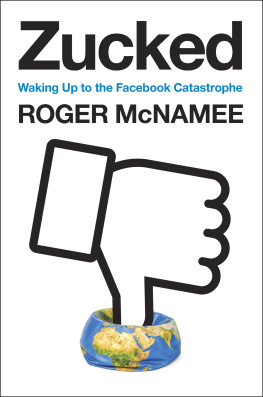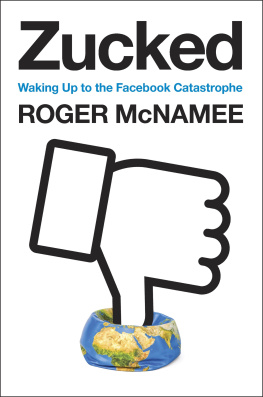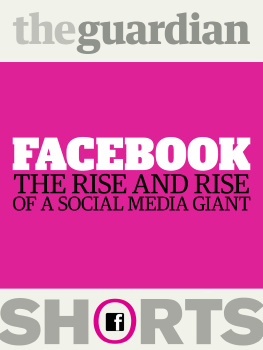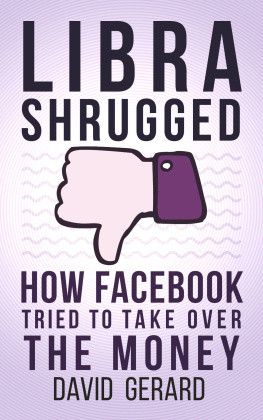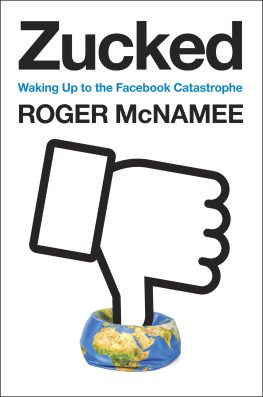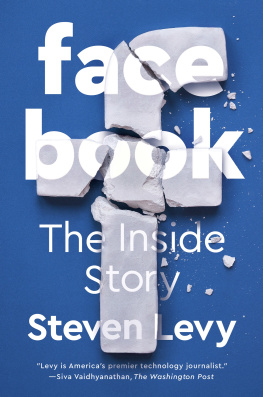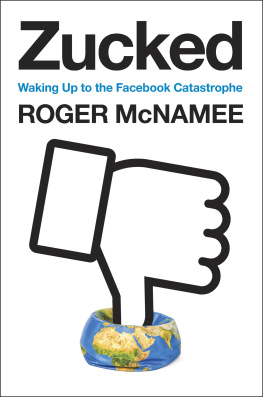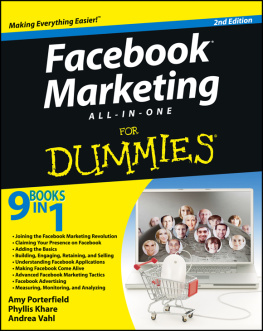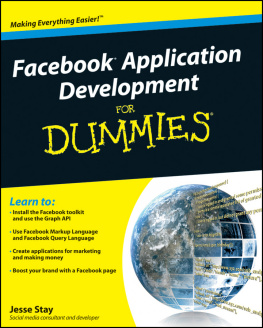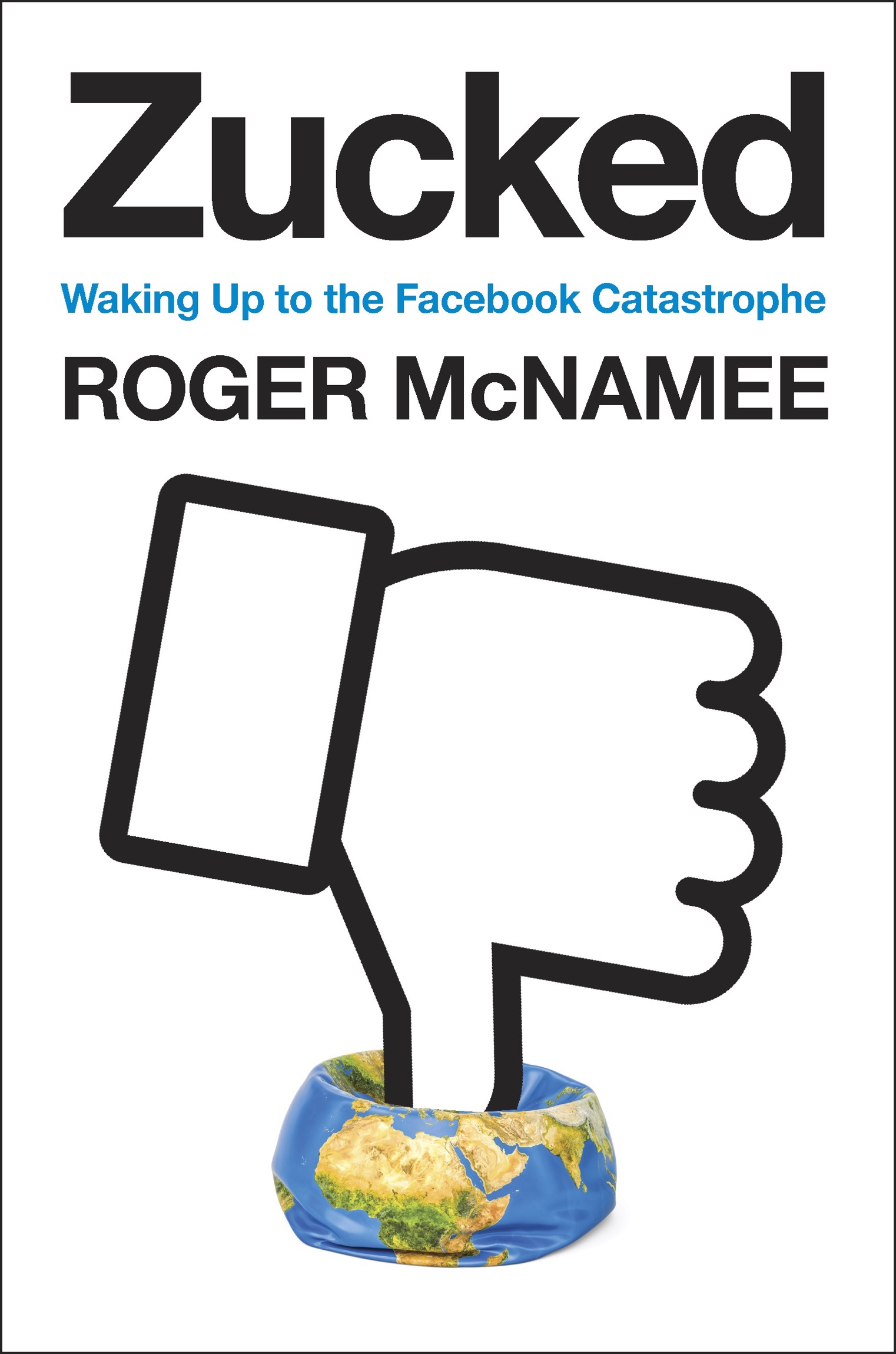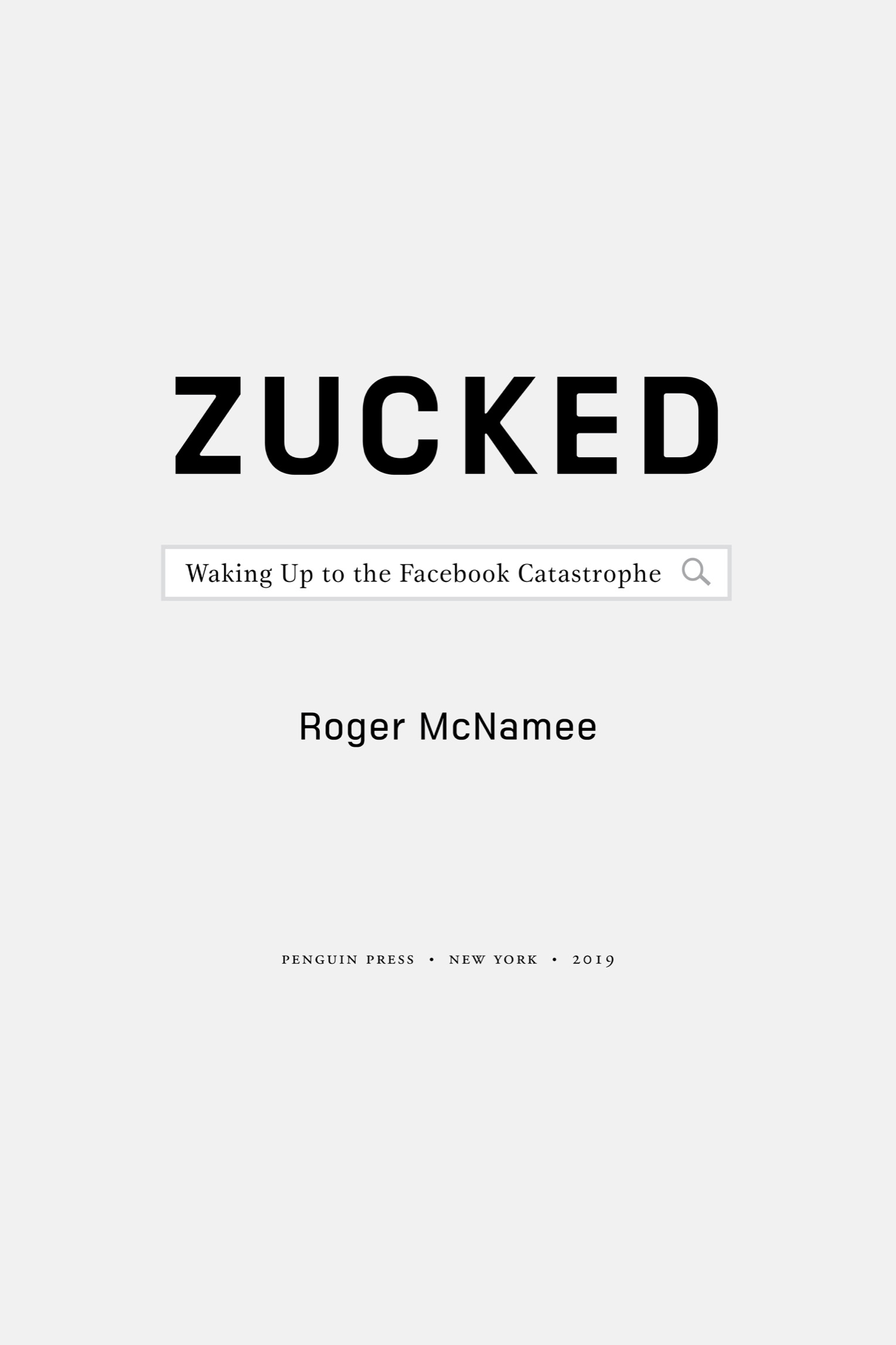Also by Roger McNamee
The New Normal
The Moonalice Legend: Posters and Words, Volumes 19
PENGUIN PRESS
An imprint of Penguin Random House LLC
penguinrandomhouse.com
Copyright 2019 by Roger McNamee
Penguin supports copyright. Copyright fuels creativity, encourages diverse voices, promotes free speech, and creates a vibrant culture. Thank you for buying an authorized edition of this book and for complying with copyright laws by not reproducing, scanning, or distributing any part of it in any form without permission. You are supporting writers and allowing Penguin to continue to publish books for every reader.
The Current Moment in History, remarks by George Soros delivered at the World Economic Forum meeting, Davos, Switzerland, January 25, 2018. Reprinted by permission of George Soros.
LIBRARY OF CONGRESS CATALOGING-IN-PUBL ICATION DATA
Names: McNamee, Roger, author.
Title: Zucked : waking up to the facebook catastrophe / Roger McNamee.
Description: New York : Penguin Press, 2019. | Includes bibliographical references and index.
Identifiers: LCCN 2018048578 (print) | LCCN 2018051479 (ebook) | ISBN 9780525561361 (ebook) | ISBN 9780525561354 (hardcover) | ISBN 9781984877895 (export)
Subjects: LCSH: Facebook (Electronic resource)Social aspects. | Online social networksPolitical aspectsUnited States. | DisinformationUnited States. | PropagandaTechnological innovations. | Zuckerberg, Mark, 1984 Influence. | United StatesPolitics and government.
Classification: LCC HM743.F33 (ebook) | LCC HM743.F33 M347 2019 (print) | DDC 302.30285dc23
LC record available at https://lccn.loc.gov/2018048578
While the author has made every effort to provide accurate telephone numbers, internet addresses, and other contact information at the time of publication, neither the publisher nor the author assumes any responsibility for errors or for changes that occur after publication. Further, the publisher does not have any control over and does not assume any responsibility for author or third-party websites or their content.
Version_1
To Ann, who inspires me every day
Technology is neither good nor bad; nor is it neutral.
Melvin Kranzbergs First Law of Technology
We cannot solve our problems with the same thinking we used when we created them.
Albert Einstein
Ultimately, what the tech industry really cares about is ushering in the future, but it conflates technological progress with societal progress.
Jenna Wortham
CONTENTS
Prologue
Technology is a useful servant but a dangerous master. C HRISTIAN L OUS L ANGE
November 9, 2016
The Russians used Facebook to tip the election!
So began my side of a conversation the day after the presidential election. I was speaking with Dan Rose, the head of media partnerships at Facebook. If Rose was taken aback by how furious I was, he hid it well.
Let me back up. I am a longtime tech investor and evangelist. Tech had been my career and my passion, but by 2016, I was backing away from full-time professional investing and contemplating retirement. I had been an early advisor to Facebook founder Mark ZuckerbergZuck, to many colleagues and friendsand an early investor in Facebook. I had been a true believer for a decade. Even at this writing, I still own shares in Facebook. In terms of my own narrow self-interest, I had no reason to bite Facebooks hand. It would never have occurred to me to be an anti-Facebook activist. I was more like Jimmy Stewart in Hitchcocks Rear Window. He is minding his own business, checking out the view from his living room, when he sees what looks like a crime in progress, and then he has to ask himself what he should do. In my case, I had spent a career trying to draw smart conclusions from incomplete information, and one day early in 2016 I started to see things happening on Facebook that did not look right. I started pulling on that thread and uncovered a catastrophe. In the beginning, I assumed that Facebook was a victim and I just wanted to warn my friends. What I learned in the months that followed shocked and disappointed me. I learned that my trust in Facebook had been misplaced.
This book is the story of why I became convinced, in spite of myself, that even though Facebook provided a compelling experience for most of its users, it was terrible for America and needed to change or be changed, and what I have tried to do about it. My hope is that the narrative of my own conversion experience will help others understand the threat. Along the way, I will share what I know about the technology that enables internet platforms like Facebook to manipulate attention. I will explain how bad actors exploit the design of Facebook and other platforms to harm and even kill innocent people. How democracy has been undermined because of design choices and business decisions by internet platforms that deny responsibility for the consequences of their actions. How the culture of these companies causes employees to be indifferent to the negative side effects of their success. At this writing, there is nothing to prevent more of the same.
This is a story about trust. Technology platforms, including Facebook and Google, are the beneficiaries of trust and goodwill accumulated over fifty years by earlier generations of technology companies. They have taken advantage of our trust, using sophisticated techniques to prey on the weakest aspects of human psychology, to gather and exploit private data, and to craft business models that do not protect users from harm. Users must now learn to be skeptical about products they love, to change their online behavior, insist that platforms accept responsibility for the impact of their choices, and push policy makers to regulate the platforms to protect the public interest.
This is a story about privilege. It reveals how hypersuccessful people can be so focused on their own goals that they forget that others also have rights and privileges. How it is possible for otherwise brilliant people to lose sight of the fact that their users are entitled to self-determination. How success can breed overconfidence to the point of resistance to constructive feedback from friends, much less criticism. How some of the hardest working, most productive people on earth can be so blind to the consequences of their actions that they are willing to put democracy at risk to protect their privilege.
This is also a story about power. It describes how even the best of ideas, in the hands of people with good intentions, can still go terribly wrong. Imagine a stew of unregulated capitalism, addictive technology, and authoritarian values, combined with Silicon Valleys relentlessness and hubris, unleashed on billions of unsuspecting users. I think the day will come, sooner than I could have imagined just two years ago, when the world will recognize that the value users receive from the Facebook-dominated social media/attention economy revolution masked an unmitigated disaster for our democracy, for public health, for personal privacy, and for the economy. It did not have to be that way. It will take a concerted effort to fix it.
When historians finish with this corner of history, I suspect that they will cut Facebook some slack about the poor choices that Zuck, Sheryl Sandberg, and their team made as the company grew. I do. Making mistakes is part of life, and growing a startup to global scale is immensely challenging. Where I fault Facebookand where I believe history will, as wellis for the companys response to criticism and evidence. They had an opportunity to be the hero in their own story by taking responsibility for their choices and the catastrophic outcomes those choices produced. Instead, Zuck and Sheryl chose another path.

